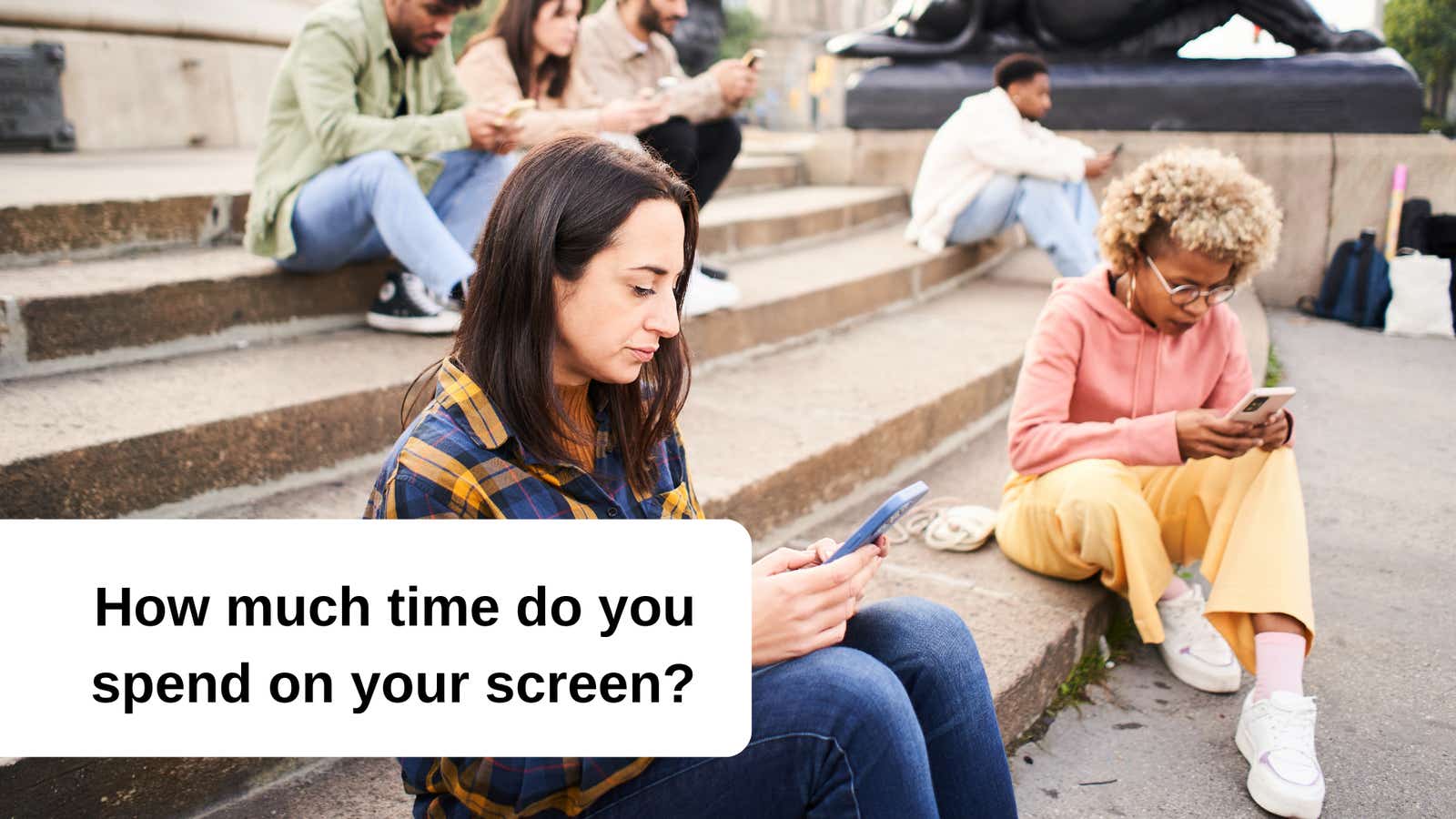As we spend an increasing amount of our time on our screens, it's no surprise that by 2020, the average adult spent three hours a day on social media. To find out how our habits have changed over the past two years, Uswitch has created a 2022 screen time report, to find out how UK adults interact with their screens, and what they do to reduce their screen time.
A good mobile phone deal can help limit time spent on screens, especially when opting for a package that doesn’t include an unlimited data allowance. If you’re looking to go a step further, then a SIM only deal can be a cheaper way to own a mobile phone, especially if you want to reduce your screen time by replacing your smartphone with a dumb phone.
Giving your child a dumb phone instead of a smartphone, or setting parental controls if they do have a smartphone can be a great way to reduce your child's time spent on screens, while still being able to get in touch with them when they’re out of the house.
The UK’s average screen time per day is five hours
Uswitch’s 2022 survey has found that the average screen time among UK adults is now five hours per day in addition to any screen related work. This has increased by two hours a day since 2020.
Where does the UK spend most of their screen time?

The UK is a TV bingeing nation. Almost half of UK adults spend 3-4 hours watching TV per day. This equates to 1,095 hours watching TV shows and films per year, a combined total of over 33.6 billion hours a year.
The 2022 screen time report further highlighted that UK adults spend up to around two hours a day on Facebook, one hour and 30 mins on Instagram, one hour and 25 mins on Youtube and one hour and 15 mins on Tiktok. This totals up to six hours of social media screen time alone per day.
Which age group spends the most time on their screens?

According to the latest mobile phone statistics for 2022, younger generations are spending less time watching TV, and more time scrolling through social media, with those aged 16-24 spending the most amount of time on Instagram compared to any other age group. In fact, almost one in 10 people aged between 16 and 24 spend seven hours a day on Instagram. That's 2,555 hours a year scrolling through the image-focused app.
Millennials, the last generation to grow up without smartphones and social media as we know it today, are most active at setting screen time limits, with almost half of those aged 25 to 34 setting daily caps.
Those aged over 55 seem content with their time spent on screens, with almost three in four not feeling the need to reduce their screen time at all.
Screen time differences between men and women
So what about scrolling habits when it comes to men and women? Interestingly, when looking at mobile apps, men spend more time on Twitter, TikTok and dating apps compared to women.
When it comes to setting screen time limits, the survey showed that men tend to spend an extra hour on their screens each day, limiting themselves to four hours compared to three hours for women. They also find it more difficult to stick to, with men being three times more likely to break their screen time limit than women.
It seems that the extra hour men spend on screens per day is most often spent watching TV, whereas women tend to spend their daily screen time on social media apps, such as Facebook, Instagram and TikTok.
How much screen time is too much?
The most popular screen time limit is four hours in the UK, with one in five setting their cap at this number. Of those people who set themselves limits, almost 90% feel that it works in limiting their screen time overall.
But how much screen time is healthy? While many of us are not able to do our work without a screen every day, reducing our screen time outside of work can be hugely beneficial. Experts suggest that we should spend no more than two hours of screen time each day outside of work parameters. This means that the majority of adults in the UK need to reduce their screen time by more than half to stay within a recommended healthy range.
Screen time impact on mental health
Too much screen time affects your health, not only impacting mental health, but physical health as well, including eye fatigue, dry and irritated eyes and loss of focus. If you notice any of these symptoms, it’s probably a sign that your eyes need a rest. If you’re not able to take a break from your screen, then resting your eyes every 20 minutes can help, focusing on something around 20 feet away for 20 seconds at a time.
Finding a way to check your screen time regularly can also help you keep tabs on your usage. Most smartphones will allow you to set screen time limits, so that you are reminded if you have spent a certain amount of time on selected apps.
Tips on how to reduce your screen time
While many might be conscious of how much time they’re spending in front of screens thanks to Screen Time notifications, being surrounded by constant entertainment is addictive. Here are some tips to help reduce your screen time and its effects:

Go easy on the eyes and turn on dark mode.
Make a note of how much time you’re spending in front of a screen and make a consistent effort to reduce your screen time. This can be done by implementing a no phones before bed rule, setting a time limit on social media apps through your phones settings so you can’t access them or going on a walk at lunch time rather than scrolling.
Take on a new hobby. Whether you’ve always wanted to become the next Bob Ross at painting or you’d like to try out a new fitness class at the gym, it’s the perfect way to get away from the screen for an hour.
4. Take a digital detox by substituting your usual binge-watching with spending more time with friends or getting creative in the kitchen
FAQ's
How do I limit my screen time?
Set device screen time caps. Your device will notify you when you have reached your limit and give you the option to extend or end your activity. This can help you reduce your screen time.
How do you check screen time on a Samsung phone?
Checking your screen time on a Samsung mobile is slightly different, simply click on: Settings > Digital Wellbeing & parental controls > → > Screen time. This will display your daily screen time data, and allow you to set goals.
How do you check screen time on an iPhone?
Checking your screen time on an iPhone is easy, simply click on: Settings > Screen Time > See All Activity. This will show you a breakdown of your trends when using your iPhone, looking at average usage, trends and weekly data. You can also set yourself limits for groups of apps or individual apps.
Screentime report 2020
Screentime report 2020
Most of us will have received the dreaded Screen Time notification telling us how much time we’ve spent on our phones in the last week.
Research has revealed that in 2020 the average adult spent three hours a day on social media, in comparison to only 90 minutes in 2012. Further research has shown that spending too much time on your mobile phone can contribute to mental health issues.
We have looked into what percentage of our lives we spend glued to the screen and what effects this can have on our wellbeing.
UK adults spend half of every day in front of a screen
While social media isn’t new (remember Myspace and Bebo?) the UK’s addiction to the platforms really took hold over the last decade. The decade that brought us Instagram, Pinterest and Snapchat amongst others.
Our study reveals that in 2010, 51% of males and 56% of females aged between 16 - 24 had created at least one social media account. In comparison, in 2019 78% of males and 86% of females of the same age had a social media profile. The growth in these percentages demonstrates the younger generations' reliance on social media media that has become a staple in everyday life.
Social media has become a vital means of staying connected, whether we’re communicating on Facebook Messenger or using Tinder and Hinge to meet new people. These days, most new conversations don’t start by picking up the phone for a call, instead asking someone for their Instagram or Snapchat handle.
Our study reveals that the average UK citizen spends up to 6.4 hours a day on the internet using any device, which is nearly the same amount of time as an average shift at work. In addition, the study shows that UK adults spend on average four hours a day watching TV, which is 1,350 hours per year! UK adults spend almost half of the day in front of the screen, browsing the internet and watching television.
In addition, we spend 1.8 hours a day on social media and 1.3 hours listening to music, totalling that UK adults are spending on average 4,542 hours in front of a screen each year.
Brits watch nearly 1,000 hours of TV every year
Sitting in front of the TV watching the news or the latest soap has been a staple in British culture since the 1950s. From live TV, streaming, gaming and YouTube to watching on demand, there are so many ways we consume television.
Despite the growth in streaming, live TV still holds its weight against the big streaming services, such as Netflix and Amazon Prime. Our data reveals that Brits spend up to 21 hours a week watching live TV, which is equivalent to 997 hours a year!
A 2017 study from TV Licensing found the main public service broadcast channels (BBC1, BBC2, ITV/ STV/UTV, Channel 4 and Channel 5) held half of the total broadcast TV audience despite the growing list of choices consumers have today.
In second place is streaming, with UK adults spending 71 minutes per day using SVod services, equivalent to 398 hours per year. The TV Licensing study also found that in 2016 BBC iPlayer was the most popular streaming service among adults, with 61% of respondents saying they use it.
The study also revealed that 38% of respondents watched YouTube, with UK adults spending 48 minutes per day on the site - that’s 269 hours a year. Time spent watching YouTube has surpassed more traditional mediums, such as recorded playback and DVDs.
Americans spend on average 325 hours a year on Facebook
Social networks have revolutionised how we communicate with one another. Long gone are the days where you would need a landline or Yellow Pages to communicate. 85% of Americans have a smartphone with its main use to communicate through social media apps.
The study reveals that Americans are spending 35 minutes on average a day using social media, which is 195 hours a year. The biggest culprit in grabbing American’s attention is Facebook, with US users spending on average 58 minutes a day on the app, which is 325 hours a year!
Coming in at second is Instagram. The image sharing network is popular amongst Gen-Z and it’s not hard to see why so many Americans get sucked into scrolling through their feed for extensive periods of time. Americans are spending up to 53 minutes a day on these apps, which is equivalent to up to 297 hours a year.
We might not pay close attention to how much time we spend scrolling on our phones due to the endless news feeds that apps have today. But studies have shown that screen time releases dopamine to the brain which can negatively affect impulse control and, make screen time very addictive.
Americans are guilty of scrolling on social media and watching TV at the same time
With access to thousands of TV shows and movies ready to binge at our fingertips, research reveals that 74% of Americans are signed up to a streaming service. While we might think we’re paying attention to the latest episode of Stranger Things or true crime drama, many of us are often scrolling on our phones at the same time.
Our study shows that Americans are spending similar amounts of time watching TV (3.29 hours) and on their mobile (3.49 hours) per day. According to Neilsen, many use their mobiles as an extension of entertainment. 71% of subjects from Neilsen’s study said they used their smartphone to find out more information about what they’re watching, 41% said they use devices to send messages about what they're watching, and 28% said they used social-media apps to read and write posts during the show.
Our study also revealed which American states spend the most time on screens, with Arizona coming in first place with an average of 4.6 hours per day or 1,546 hours per year. This is closely followed by Connecticut and Nevada with 4.4 hours per day, equivalent to four episodes of Game of Thrones or 12 episodes of The Simpsons. The state with the lowest screen time was Alabama whose residents consumed only 1.8 hours a day, followed by Vermont (2.1 hours) and Oklahoma (2.2 hours).
Gen-Z are spending a shocking nine hours per day in front of a screen
Since its launch in 2010, Instagram has gained one billion active users and is one of the most popular apps amongst Gen-Z. Our study reveals that its users are predominantly the ages 13-17 (6.8%), 18-24 (25.30%) and 25-34 (30.90%).
Facebook has seen a decline in users over the past few years especially in the younger demographic, with studies showing that 65% of Gen-Z check Instagram on a daily basis in comparison to 35% who do the same on Facebook. The younger generation is gravitating towards apps like Instagram and TikTok, as they allow them to be more creative and express themselves. Facebook is often seen as the place you’ll find your parents.
Our study has revealed that kids aged between 5-16 are spending up to nine hours a day in front of screens. A report by Commonsense Media revealed that the percentage of Gen-Z who say they watch online videos every day has more than doubled since 2015, from 24% to 56% among 8-12 year olds, and from 34% to 69% among 13-18 year olds.
Despite the boom in television content, the study reveals that tweens and teens are spending less time watching TV on a traditional television set. The percentage who say they enjoy watching TV has dropped from 61% to 50% among tweens, and from 45% to 33% for teens, over the past four years. Our study reveals that kids are spending the same amount of time on the internet as they are watching television, which suggests that they are doing this simultaneously.
Too much screen time can have effects on mental and physical health
While we might enjoy watching the latest vlog, calling friends on FaceTime or posting to Instagram, spending too much time staring at a screen does have a downside. There is a big correlation between screen time and its effects on health.
Too much time in front of the screen can have adverse health effects, from weight gain and poor sleep to increased susceptibility to certain diseases. The increase in screen time goes hand in hand with sedentary behaviour, which in turn could lead to poorer physical health and wellbeing. In addition, the constant use of screens has a negative effect on sleep for children and young people, which is vital for good wellbeing and health.
Numerous studies reveal that extensive periods of screen time can lead to depression and anxiety. With the growth of social media apps comes unrealistic standards that are portrayed on these apps to show the “perfect” life. These comparisons can lead to negative thoughts, low self esteem and confidence issues. Studies have shown that adults who watched TV or used a computer for more than six hours per day were more likely to experience moderate to severe depression.
Tips to reduce your screen time
While many might be conscious of how much time they’re spending in front of screens thanks to Screen Time notifications, being surrounded by constant entertainment is addictive. Here are some tips to help reduce your screen time and its effects:
Go easy on the eyes and turn on dark mode.
Make a note of how much time you’re spending in front of a screen and make a consistent effort to reduce your screen time. This can be done by implementing a no phones before bed rule, setting a time limit on social media apps through your phones settings so you can’t access them or going on a walk at lunch time rather than scrolling.
Take on a new hobby, whether you’ve always wanted to become the next Bob Ross at painting or you’d like to try out a new fitness class at the gym, it’s the perfect way to get away from the screen for an hour.
Take a digital detox by substituting your usual binge watching with spending more time with friends or getting creative in the kitchen.
Methodology
Using data collated from OfCom, Statista, NHSGGC and Broadband Search, we’ve looked into the percentage of our time spent in front of screens and what effects this can have on wellbeing.
All data is correct as of 2 June 2021.
Methodology and sources
Methodology and sources
Original data (Screen time report 2020)
Using data collated from OfCom, Statista, NHSGGC and Broadband Search, we’ve looked into the percentage of our time spent in front of screens and what effects this can have on wellbeing.
All data is correct as of 2 June 2021.
Sources
Screen time report 2022
A 2022 survey was run on 10/08/2022-11/08/2022 by Uswitch, asking 2,005 UK adults the following:
What's your screen time per day?
How many hours of TV do you watch per day?
How many hours do you spend on Facebook each day?
How many hours do you spend on Instagram each day?
How many hours do you spend on Twitter each day?
How many hours do you spend on TikTok each day?
How many hours do you spend on Youtube each day?
How many hours do you spend on Dating apps each day? Have you set a screen time limit?
What is your screen time limit per day?
How do you set this limit?
Does it work?
Would you like to reduce your screen time?
Sources




